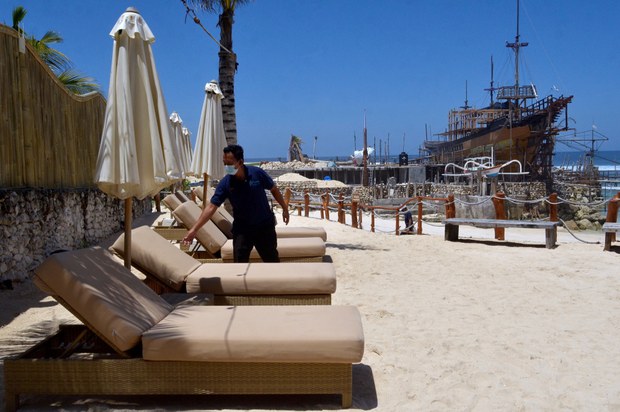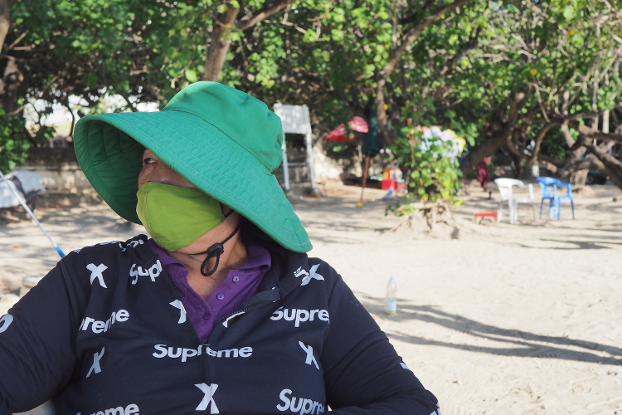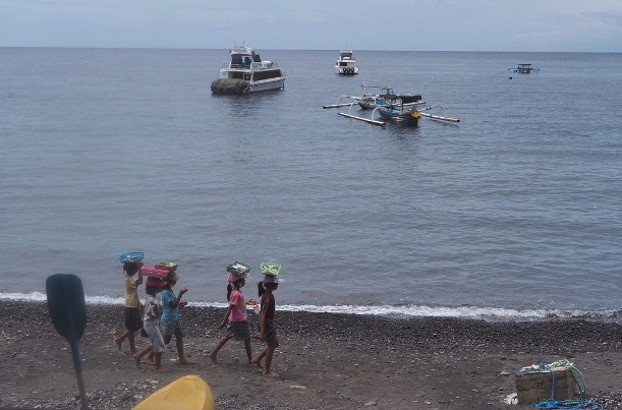In Indonesia, Empty Beaches Leave Bali’s Economy in ‘Tatters’
2021.09.27
Badung, Indonesia
 A resort worker prepares beach chairs as the Indonesian government eased COVID-19 social restrictions on Bali Island, Sept. 14, 2021.
A resort worker prepares beach chairs as the Indonesian government eased COVID-19 social restrictions on Bali Island, Sept. 14, 2021.
Gek Ratih, who sells souvenirs at Bali’s popular Kuta Beach for a living, has endured the ups and downs of the island’s tourism over the years – everything from terrorist bombings to volcanic eruptions.
But nothing, she says, prepared her for the COVID-19 pandemic.
“I have had almost zero income nowadays,” Ratih, 60, told BenarNews.
She and other Balinese are hoping that their businesses will begin to pick up after Indonesia’s government announced earlier this month that it may re-open Bali to fully vaccinated foreign tourists from select countries, beginning in October, should coronavirus cases keep declining.
Before the viral outbreak hit Indonesia last year, Bali was a magnet for foreign tourists, beach-goers and surfers. On the day BenarNews spoke with Ratih, Kuta Beach was largely empty, and a nearby surf shop had no customers.
“I haven’t sold anything today,” said Ratih, who for 40 years has been selling clothes, hats and bracelets to tourists.
Luhut Pandjaitan, the central government official in charge of Indonesia’s handling of the pandemic, said no date had been set for allowing foreign visitors to return to Bali, the country’s top tourist destination.
The island has lost about 9.7 trillion rupiah (U.S. $680.5 million) each month during the pandemic while outsiders were barred from Bali for the reason of keeping the public safe, said Bali’s deputy governor, Tjokorda Oka Artha Ardana Sukawati.
“Bali is in tatters because it is highly dependent on tourism,” Tjokorda told an online seminar in mid-September. “Other regions are more resilient because they have other sectors that contribute to the economy.”

While foreign tourists remain barred, Indonesians have begun to return to Bali as restrictions to curb the spread of coronavirus have been relaxed gradually across the country.
“Bali’s tourism has started to improve,” said I Gusti Ngurah Rai Suryawijaya, chairman of the Indonesian Hotel and Restaurant Association (PHRI) in Bali’s Badung regency.
Lately, about 5,000 visitors from other parts of Indonesia have come to Bali each day, an increase from about 1,000 daily during the pandemic’s semi-lockdown period, he said.
Still, the hotel occupancy rate is below 9 percent, Rai said.
“Ideally, occupancy should be at least 40 percent for hotels to reach a break-even point. If it is still a single digit, it is impossible to cover operational costs,” he said.
The number of Bali visitors is far below pre-pandemic numbers, when daily domestic arrivals could be as high as 20,000 and foreign arrivals were more than 16,000.
Foreign tourist arrivals in Bali reached 6.3 million people in 2019, according to the Central Bureau of Statistics, but fell to 1 million in 2020 because of the pandemic. Most of those travelers arrived during the first quarter of 2020 before the pandemic forced lockdowns.
Rai said Bali’s tourism was at its “lowest point” – worse than the aftermath of the 2002 and 2005 terrorist bombings, as well as eruptions from the Mount Agung volcano in 2019.
“At that time Bali quickly rebounded because of support from the government and the international community. Those things are absent now because everyone is affected,” he said.
New approaches to tourism
Nyoman Sukma Arida, a lecturer at Bali’s Udayana University, said the island should change its focus to offer “high-quality tourism” including promoting ecotourism, which unites conservation, communities and sustainable travel.
“The management of Bali’s tourism should be directed toward that aim and no longer be oriented to mass tourism,” Sukma told BenarNews.
He challenged previous remarks by Luhut that backpacking tourists, also known as budget travelers, be banned.
“We will filter tourists that come to visit. We don’t want backpackers to come so that Bali remains clean, where the people who come are of quality,” Luhut had told reporters earlier this month.
Sukma said backpackers should be welcomed.
“Backpacking tourism doesn’t mean low-quality tourism. It could be they spend more money directly to the community, not on big hotels,” Sukma said.
Tourism Minister Sandiaga Uno sought to clarify Luhut’s remarks.
“Mr. Luhut was talking about tourists who bring no benefits, don’t obey health protocols and don’t respect local customs. These are not the kind of tourists we are trying to attract post-pandemic,” he told reporters last week.
“I can assure you there will be no ban on tourists visiting Indonesia. Backpacking is a trend among young people. We will not ban backpackers as long as they follow rules,” he said.

Ben Mathis, a Swiss computer programmer who lives in Bali, agreed with Sukma.
“This is an opportunity for Bali to change things, to build the capacity and the infrastructure and everything needed to create a more sustainable tourism sector, to diversify its economy, to value its farmers and its land that is now helping Bali through this pandemic,” Mathis told BenarNews.
The pandemic has created an opportunity for the government to tap into other economic sectors including agriculture, according to Tjokorda, Bali’s deputy governor.
“If these two sectors [tourism and agriculture] can be used as the locomotive for the economy in a balanced way, I believe Bali will be able to face adversity like this,” he said.
Rai, meanwhile, said he hoped the government would soon re-open Bali to international tourists.
“Bali has managed to deal with the pandemic well so far,” he said.
Compliance with health guidelines, the success of the vaccination campaign on the island, and strict health protocols in tourism facilities means that Bali is ready to welcome foreign visitors, he said.
To date, Bali has recorded more than 112,000 COVID-19 cases, about 2.7 percent of Indonesia’s caseload, and 3,900 virus-related deaths. Meanwhile, the government said that about 90 percent of Bali’s 4.4 million people had received at least one dose of a vaccine.
Rai also asked the government to extend 9.4 trillion rupiah ($660 million) in soft loans to fund the recovery of the hospitality industry.
“We need capital injections to reopen to pay maintenance, electricity bills and employees’ salaries after the collapse,” he said.







